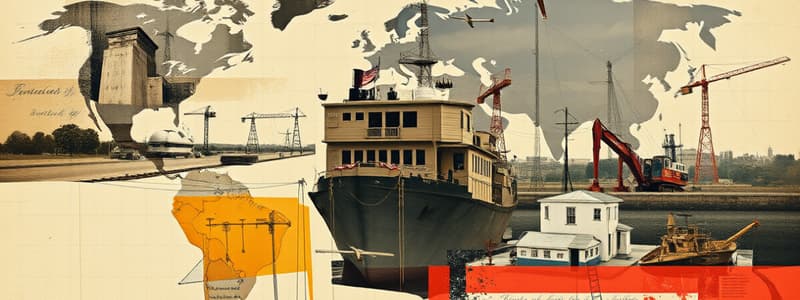Podcast
Questions and Answers
Which of the following is NOT considered a natural resource?
Which of the following is NOT considered a natural resource?
- Labor (correct)
- Wildlife
- Water
- Soil
Free trade involves the use of tariffs and quotas to control international trade.
Free trade involves the use of tariffs and quotas to control international trade.
False (B)
What is one key component needed for a country to prepare for globalization?
What is one key component needed for a country to prepare for globalization?
Education
_____ refers to the economic and political system where industries are controlled by private owners.
_____ refers to the economic and political system where industries are controlled by private owners.
Match the following components with their descriptions:
Match the following components with their descriptions:
Which of the following is a negative aspect of globalization?
Which of the following is a negative aspect of globalization?
Job displacement can occur due to economic recessions.
Job displacement can occur due to economic recessions.
What does the term 'brain drain syndrome' refer to?
What does the term 'brain drain syndrome' refer to?
Trade liberalization can threaten developing nations by forcing them to compete with _____ economies.
Trade liberalization can threaten developing nations by forcing them to compete with _____ economies.
Match the negative impacts of globalization with their descriptions:
Match the negative impacts of globalization with their descriptions:
Flashcards are hidden until you start studying
Study Notes
Globalization Preparation Needs
- Infrastructure: Essential physical and organizational structures required for societal and enterprise functionality.
- Education: Fundamental for development, forming the basis for economic and social well-being.
- Human Resources: Involves recruitment, training, labor laws, communication, expatriation, attracting, and retaining talent.
Natural and Economic Resources
- Natural Resources: Include air, land, water, wildlife, plants, and soil; crucial for meeting basic needs like food, energy, and health.
- Free Trade: International trade without tariffs, quotas, or restrictions facilitating seamless goods exchange.
Information Flow and Communication
- Mass Media: Global information dissemination influenced by capitalism, technology, and commercialism, primarily benefiting Western markets.
- Technology and Internet: Enable communication without face-to-face interaction, transcending physical borders.
- Social Media & Networking: Platforms for creating and sharing information and videos through computer and internet tools.
Migration and Economic Systems
- Transnational Migration: Movement of people across countries for various reasons, including economic opportunities as foreign or guest workers.
- Capitalism: Economic and political framework where industries and trade are privately controlled, governed by supply and demand rather than state ownership.
Threats and Governance
- Terrorism: Use of violence to create fear and exert control over societies.
- International Organizations (Regionalism): Groups functioning across borders to address global issues collaboratively.
- State's Sovereignty: The authority of a governing body to self-govern without external interference.
Positive Effects of Globalization
- Business Expansion: Greater competition and technological advancements foster increased investment and production efficiency.
- Labor Impact: Creation of jobs that generate incomes, leading to tax revenue and increased goods production both locally and globally.
- Trade Opportunities: Countries trade resources they lack, enhancing economic interdependence.
- New Production Processes: Adaptation from raw materials to finished products boosts manufacturing capabilities.
Negative Effects of Globalization
- Harm to Developing Economies: Trade liberalization pressures weaker economies to compete with stronger ones, threatening their stability.
- Environmental Costs: Impacts include carbon emissions, pollution, energy consumption, and depletion of natural resources.
- Natural Calamities: Events causing significant societal harm following disasters can overwhelm local resources and recovery efforts.
- Brain Drain: Loss of skilled workers to other countries, undermining local talent pools.
- Cultural Homogenization: Diminishing cultural diversity as global influences overshadow local traditions.
- Job Displacement: Economic shifts and company restructures can lead to involuntary job losses, especially among less educated workers.
Studying That Suits You
Use AI to generate personalized quizzes and flashcards to suit your learning preferences.




